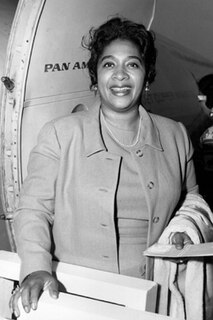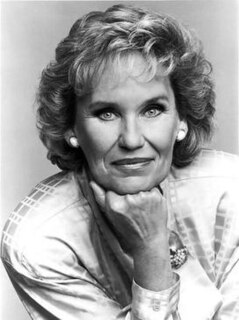Related Research Articles

Sidney Joseph Bechet was an American jazz saxophonist, clarinetist, and composer. He was one of the first important soloists in jazz, and first recorded several months before trumpeter Louis Armstrong. His erratic temperament hampered his career, and not until the late 1940s did he earn wide acclaim.

James Peter Giuffre was an American jazz clarinetist, saxophonist, composer, and arranger. He is known for developing forms of jazz which allowed for free interplay between the musicians, anticipating forms of free improvisation.
Paul Quinichette was an American jazz tenor saxophonist. He was known as the "Vice President" or "Vice Prez" for his emulation of the breathy style of Lester Young, whose nickname was "The President", or simply "Prez". Young called Quinichette "Lady Q".

The Eastern Hockey League was a minor professional United States ice hockey league.

John Marshall Alexander Jr., known by the stage name Johnny Ace, was an American rhythm-and-blues singer and musician. He had a string of hit singles in the mid 1950s. Alexander died of an accidental self-inflicted gunshot wound at the age of 25.

Mozart Camargo Guarnieri was a Brazilian composer.
Emmons can refer to:

Herva Nelli was an Italian-American operatic soprano.

The San Antonio Symphony is a full-time professional symphony orchestra based in San Antonio, Texas. Its season runs from late September to early June. Sebastian Lang-Lessing, whose tenure ended in 2020, is Music Director Emeritus.

The Paramount Television Network (PTN) was a venture by American film corporation Paramount Pictures to organize a television network in the late 1940s. The company built television stations KTLA in Los Angeles and WBKB in Chicago; it also invested $400,000 in the DuMont Television Network, which operated stations WABD in New York City, WTTG in Washington, D.C., and WDTV in Pittsburgh. Escalating disputes between Paramount and DuMont concerning breaches of contract, company control, and network competition erupted regularly between 1940 and 1956, and culminated in the dismantling of the DuMont Network. Television historian Timothy White called the clash between the two companies "one of the most unfortunate and dramatic episodes in the early history of the television industry."
The Robert Shaw Chorale was a renowned professional choir founded in New York City in 1948 by Robert Shaw, a Californian who had been drafted out of college a decade earlier by Fred Waring to conduct his glee club in radio broadcasts.
The Marian Anderson Award was originally established in 1943 by African American singer Marian Anderson after she was awarded the $10,000 Bok Prize that year by the city of Philadelphia. Anderson used the award money to establish a singing competition to help support young singers; recipients of which include Camilla Williams, Nathaniel Dickerson (1944), Louise Parker (1944), Eudice Mesibov, née Charney (1946), Rawn Spearman (1949), Georgia Laster (1951), Betty Allen (1952), Gloria Davy (1952), Judith Raskin, Shirlee Emmons (1953), Miriam Holman (1954), Willis Patterson (1956), Shirley Verrett (1957), Billie Lynn Daniel (1963), and Joyce Mathis (1967). Eventually, the prize fund ran out of money and it was disbanded. Florence Quivar was the last recipient of this earlier award in 1976.
Mack Kendree Harrell, Jr. was an American operatic and concert baritone vocalist who was regarded as one of the greatest American-born lieder singers of his generation.

Adelaide Bishop was an American operatic soprano, musical theatre actress, opera director, stage director, and voice teacher. She began her career appearing in Broadway musicals as a teenager during the early 1940s. She became a principal soprano with the New York City Opera (NYCO) in 1948, where she performed through 1960 in a broad repertoire encompassing German, French, Italian, and English operas from a variety of musical periods. In the late 1950s, she started working actively as a stage director and as a voice teacher, working with many opera companies throughout the United States and serving on the music faculties of several different American universities. She also served as the artistic director of the Wolf Trap Opera for many years.

Betty Allen was an American operatic mezzo-soprano who had an active international singing career during the 1950s through the 1970s. In the latter part of her career her voice acquired a contralto-like darkening, which can be heard on her recording of Sergei Prokofiev’s Alexander Nevsky with conductor Eugene Ormandy and the Philadelphia Orchestra. She was known for her collaborations with American composers, such as Leonard Bernstein, Aaron Copland, David Diamond, Ned Rorem, and Virgil Thomson among others.

Shirlee Emmons was an American classical soprano, voice teacher, and author on vocal pedagogy. She began her career in the early 1940s as a concert soprano, eventually becoming one of the original singers in the Robert Shaw Chorale in 1948. She branched out into opera in the 1950s; performing mainly with regional companies in the United States. She achieved several honours as a performer, including winning the Marian Anderson Award in 1953 and an Obie Award in 1956.
Leon Lishner was an American operatic bass-baritone. He was particularly associated with the works of Gian Carlo Menotti, having created parts in the world premieres of four of his operas. He performed in many productions with the New York City Opera and the NBC Opera Theatre during the 1950s and early 1960s.
Howard Spencer Richmond was an American music publisher and music industry executive. He established The Richmond Organization, Inc. (TRO), one of the largest independent music publishing organizations in the world, and had a hand in commercializing and promoting many pop, folk and rock songs since the 1940s.
References
- ↑ Milligan, Harold V. (June 6, 1948). "From the Mail Pouch: Music League" . The New York Times . Retrieved 2009-09-12.
- 1 2 Downes, Olin (May 30, 1948). "HELP ON THE WAY UP; National Music League, a Cooperative, Gives Young Artists a Start" . The New York Times . Retrieved 2009-09-12.
- ↑ "HAENSEL AND GRETEL' GIVEN IN WHITE HOUSE; Performance by National Music League Follows Luncheon Party of First Lady" . The New York Times . March 31, 1935. Retrieved 2009-09-12.
- ↑ Parmenter, Ross (August 21, 1955). "WORLD OF MUSIC: CULTURAL INTERCHANGE; National Music League Expanding Its Activities to Include Four Countries" . The New York Times . Retrieved 2009-09-12.